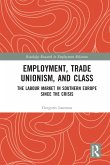Martin Seeliger
Trade Unions in the Course of European Integration (eBook, PDF)
The Social Construction of Organized Interests
42,95 €
42,95 €
inkl. MwSt.
Sofort per Download lieferbar

21 °P sammeln
42,95 €
Als Download kaufen

42,95 €
inkl. MwSt.
Sofort per Download lieferbar

21 °P sammeln
Jetzt verschenken
Alle Infos zum eBook verschenken
42,95 €
inkl. MwSt.
Sofort per Download lieferbar
Alle Infos zum eBook verschenken

21 °P sammeln
Martin Seeliger
Trade Unions in the Course of European Integration (eBook, PDF)
The Social Construction of Organized Interests
- Format: PDF
- Merkliste
- Auf die Merkliste
- Bewerten Bewerten
- Teilen
- Produkt teilen
- Produkterinnerung
- Produkterinnerung

Bitte loggen Sie sich zunächst in Ihr Kundenkonto ein oder registrieren Sie sich bei
bücher.de, um das eBook-Abo tolino select nutzen zu können.
Hier können Sie sich einloggen
Hier können Sie sich einloggen
Sie sind bereits eingeloggt. Klicken Sie auf 2. tolino select Abo, um fortzufahren.

Bitte loggen Sie sich zunächst in Ihr Kundenkonto ein oder registrieren Sie sich bei bücher.de, um das eBook-Abo tolino select nutzen zu können.
With its focus on a contested political field, this book contributes to practical and theoretical debates within European trade unionism.
- Geräte: PC
- mit Kopierschutz
- eBook Hilfe
- Größe: 1.67MB
Andere Kunden interessierten sich auch für
![Trade Unions in the Course of European Integration (eBook, ePUB) Trade Unions in the Course of European Integration (eBook, ePUB)]() Martin SeeligerTrade Unions in the Course of European Integration (eBook, ePUB)42,95 €
Martin SeeligerTrade Unions in the Course of European Integration (eBook, ePUB)42,95 €![Posted Work in the European Union (eBook, PDF) Posted Work in the European Union (eBook, PDF)]() Posted Work in the European Union (eBook, PDF)42,95 €
Posted Work in the European Union (eBook, PDF)42,95 €![Minimum Wage Regimes (eBook, PDF) Minimum Wage Regimes (eBook, PDF)]() Minimum Wage Regimes (eBook, PDF)44,95 €
Minimum Wage Regimes (eBook, PDF)44,95 €![Implications of the Euro (eBook, PDF) Implications of the Euro (eBook, PDF)]() Implications of the Euro (eBook, PDF)0,00 €
Implications of the Euro (eBook, PDF)0,00 €![Trade Unions and the British Industrial Relations Crisis (eBook, PDF) Trade Unions and the British Industrial Relations Crisis (eBook, PDF)]() Peter AckersTrade Unions and the British Industrial Relations Crisis (eBook, PDF)42,95 €
Peter AckersTrade Unions and the British Industrial Relations Crisis (eBook, PDF)42,95 €![Employment, Trade Unionism, and Class (eBook, PDF) Employment, Trade Unionism, and Class (eBook, PDF)]() Gregoris IoannouEmployment, Trade Unionism, and Class (eBook, PDF)43,95 €
Gregoris IoannouEmployment, Trade Unionism, and Class (eBook, PDF)43,95 €![Employee Voice and Participation (eBook, PDF) Employee Voice and Participation (eBook, PDF)]() Jeff HymanEmployee Voice and Participation (eBook, PDF)39,95 €
Jeff HymanEmployee Voice and Participation (eBook, PDF)39,95 €-
-
-
With its focus on a contested political field, this book contributes to practical and theoretical debates within European trade unionism.
Dieser Download kann aus rechtlichen Gründen nur mit Rechnungsadresse in A, B, BG, CY, CZ, D, DK, EW, E, FIN, F, GR, HR, H, IRL, I, LT, L, LR, M, NL, PL, P, R, S, SLO, SK ausgeliefert werden.
Produktdetails
- Produktdetails
- Verlag: Taylor & Francis eBooks
- Seitenzahl: 288
- Erscheinungstermin: 17. Januar 2019
- Englisch
- ISBN-13: 9780429641992
- Artikelnr.: 55045909
- Verlag: Taylor & Francis eBooks
- Seitenzahl: 288
- Erscheinungstermin: 17. Januar 2019
- Englisch
- ISBN-13: 9780429641992
- Artikelnr.: 55045909
- Herstellerkennzeichnung Die Herstellerinformationen sind derzeit nicht verfügbar.
Martin Seeliger is an Assistant Professor at the European University of Flensburg, Germany.
Chapter 1
Introduction
Chapter 2
Introduction to the Topic and the State of Research
2.1 International trade-union cooperation
2.2 Trade unions and European integration
2.3 European collective bargaining as a challenge and indicator of
trade-union position formation
2.4 "Social Europe" as a concept and project
2.5 Assessing the potential of European trade unions: Optimists and
skeptics
2.5.1 On the state of optimistic trade-union research
2.5.2 The pessimistic position
2.6 Summary and question: How did the common positions come about?
Chapter 3
Political Fields and the Framework for Their Conceptual Study
3.1 The freedom to provide services and the posting of workers
3.2 European minimum wage
3.3 Wage coordination
3.4 Three fields, three puzzles
3.5 Methodological operationalization and data acquisition
Chapter 4
Theoretical Approach
4.1 Justification of the action theoretical approach
4.2 Trade-union policy in the multilevel system of the EU from a Pragmatist
perspective
4.3 From rational systems to discrepancy between talk and action
in organizations
4.4 Socialization in the multilevel system of the EU
4.5 "Imagining Social Europe": shared visions for the future as political
frames of reference
4.6 International position formation among European trade unions: a
synthetic approach
Chapter 5
European Collective Bargaining: Empirical Findings from the Core Areas
5.1 Profiles of the countries and trade-union organizations studied
5.2 The freedom to provide services and worker posting
5.2.1 The discussion surrounding the freedom to provide services
5.2.2 The discussion surrounding the Enforcement Directive
5.3 The discussion surrounding the European minimum wage
5.4 Wage coordination
5.5 Comparative summary of the findings
Chapter 6
Summary: The Social Construction of Organized Interests in the EU
Appendix:
A Interview partners
B Nominal unit labor-cost devdevelopment in the Eurozone
Introduction
Chapter 2
Introduction to the Topic and the State of Research
2.1 International trade-union cooperation
2.2 Trade unions and European integration
2.3 European collective bargaining as a challenge and indicator of
trade-union position formation
2.4 "Social Europe" as a concept and project
2.5 Assessing the potential of European trade unions: Optimists and
skeptics
2.5.1 On the state of optimistic trade-union research
2.5.2 The pessimistic position
2.6 Summary and question: How did the common positions come about?
Chapter 3
Political Fields and the Framework for Their Conceptual Study
3.1 The freedom to provide services and the posting of workers
3.2 European minimum wage
3.3 Wage coordination
3.4 Three fields, three puzzles
3.5 Methodological operationalization and data acquisition
Chapter 4
Theoretical Approach
4.1 Justification of the action theoretical approach
4.2 Trade-union policy in the multilevel system of the EU from a Pragmatist
perspective
4.3 From rational systems to discrepancy between talk and action
in organizations
4.4 Socialization in the multilevel system of the EU
4.5 "Imagining Social Europe": shared visions for the future as political
frames of reference
4.6 International position formation among European trade unions: a
synthetic approach
Chapter 5
European Collective Bargaining: Empirical Findings from the Core Areas
5.1 Profiles of the countries and trade-union organizations studied
5.2 The freedom to provide services and worker posting
5.2.1 The discussion surrounding the freedom to provide services
5.2.2 The discussion surrounding the Enforcement Directive
5.3 The discussion surrounding the European minimum wage
5.4 Wage coordination
5.5 Comparative summary of the findings
Chapter 6
Summary: The Social Construction of Organized Interests in the EU
Appendix:
A Interview partners
B Nominal unit labor-cost devdevelopment in the Eurozone
Chapter 1
Introduction
Chapter 2
Introduction to the Topic and the State of Research
2.1 International trade-union cooperation
2.2 Trade unions and European integration
2.3 European collective bargaining as a challenge and indicator of trade-union position formation
2.4 "Social Europe" as a concept and project
2.5 Assessing the potential of European trade unions: Optimists and skeptics
2.5.1 On the state of optimistic trade-union research
2.5.2 The pessimistic position
2.6 Summary and question: How did the common positions come about?
Chapter 3
Political Fields and the Framework for Their Conceptual Study
3.1 The freedom to provide services and the posting of workers
3.2 European minimum wage
3.3 Wage coordination
3.4 Three fields, three puzzles
3.5 Methodological operationalization and data acquisition
Chapter 4
Theoretical Approach
4.1 Justification of the action theoretical approach
4.2 Trade-union policy in the multilevel system of the EU from a Pragmatist perspective
4.3 From rational systems to discrepancy between talk and action
in organizations
4.4 Socialization in the multilevel system of the EU
4.5 "Imagining Social Europe": shared visions for the future as political frames of reference
4.6 International position formation among European trade unions: a synthetic approach
Chapter 5
European Collective Bargaining: Empirical Findings from the Core Areas
5.1 Profiles of the countries and trade-union organizations studied
5.2 The freedom to provide services and worker posting
5.2.1 The discussion surrounding the freedom to provide services
5.2.2 The discussion surrounding the Enforcement Directive
5.3 The discussion surrounding the European minimum wage
5.4 Wage coordination
5.5 Comparative summary of the findings
Chapter 6
Summary: The Social Construction of Organized Interests in the EU
Appendix:
A Interview partners
B Nominal unit labor-cost devdevelopment in the Eurozone
Introduction
Chapter 2
Introduction to the Topic and the State of Research
2.1 International trade-union cooperation
2.2 Trade unions and European integration
2.3 European collective bargaining as a challenge and indicator of trade-union position formation
2.4 "Social Europe" as a concept and project
2.5 Assessing the potential of European trade unions: Optimists and skeptics
2.5.1 On the state of optimistic trade-union research
2.5.2 The pessimistic position
2.6 Summary and question: How did the common positions come about?
Chapter 3
Political Fields and the Framework for Their Conceptual Study
3.1 The freedom to provide services and the posting of workers
3.2 European minimum wage
3.3 Wage coordination
3.4 Three fields, three puzzles
3.5 Methodological operationalization and data acquisition
Chapter 4
Theoretical Approach
4.1 Justification of the action theoretical approach
4.2 Trade-union policy in the multilevel system of the EU from a Pragmatist perspective
4.3 From rational systems to discrepancy between talk and action
in organizations
4.4 Socialization in the multilevel system of the EU
4.5 "Imagining Social Europe": shared visions for the future as political frames of reference
4.6 International position formation among European trade unions: a synthetic approach
Chapter 5
European Collective Bargaining: Empirical Findings from the Core Areas
5.1 Profiles of the countries and trade-union organizations studied
5.2 The freedom to provide services and worker posting
5.2.1 The discussion surrounding the freedom to provide services
5.2.2 The discussion surrounding the Enforcement Directive
5.3 The discussion surrounding the European minimum wage
5.4 Wage coordination
5.5 Comparative summary of the findings
Chapter 6
Summary: The Social Construction of Organized Interests in the EU
Appendix:
A Interview partners
B Nominal unit labor-cost devdevelopment in the Eurozone
Chapter 1
Introduction
Chapter 2
Introduction to the Topic and the State of Research
2.1 International trade-union cooperation
2.2 Trade unions and European integration
2.3 European collective bargaining as a challenge and indicator of
trade-union position formation
2.4 "Social Europe" as a concept and project
2.5 Assessing the potential of European trade unions: Optimists and
skeptics
2.5.1 On the state of optimistic trade-union research
2.5.2 The pessimistic position
2.6 Summary and question: How did the common positions come about?
Chapter 3
Political Fields and the Framework for Their Conceptual Study
3.1 The freedom to provide services and the posting of workers
3.2 European minimum wage
3.3 Wage coordination
3.4 Three fields, three puzzles
3.5 Methodological operationalization and data acquisition
Chapter 4
Theoretical Approach
4.1 Justification of the action theoretical approach
4.2 Trade-union policy in the multilevel system of the EU from a Pragmatist
perspective
4.3 From rational systems to discrepancy between talk and action
in organizations
4.4 Socialization in the multilevel system of the EU
4.5 "Imagining Social Europe": shared visions for the future as political
frames of reference
4.6 International position formation among European trade unions: a
synthetic approach
Chapter 5
European Collective Bargaining: Empirical Findings from the Core Areas
5.1 Profiles of the countries and trade-union organizations studied
5.2 The freedom to provide services and worker posting
5.2.1 The discussion surrounding the freedom to provide services
5.2.2 The discussion surrounding the Enforcement Directive
5.3 The discussion surrounding the European minimum wage
5.4 Wage coordination
5.5 Comparative summary of the findings
Chapter 6
Summary: The Social Construction of Organized Interests in the EU
Appendix:
A Interview partners
B Nominal unit labor-cost devdevelopment in the Eurozone
Introduction
Chapter 2
Introduction to the Topic and the State of Research
2.1 International trade-union cooperation
2.2 Trade unions and European integration
2.3 European collective bargaining as a challenge and indicator of
trade-union position formation
2.4 "Social Europe" as a concept and project
2.5 Assessing the potential of European trade unions: Optimists and
skeptics
2.5.1 On the state of optimistic trade-union research
2.5.2 The pessimistic position
2.6 Summary and question: How did the common positions come about?
Chapter 3
Political Fields and the Framework for Their Conceptual Study
3.1 The freedom to provide services and the posting of workers
3.2 European minimum wage
3.3 Wage coordination
3.4 Three fields, three puzzles
3.5 Methodological operationalization and data acquisition
Chapter 4
Theoretical Approach
4.1 Justification of the action theoretical approach
4.2 Trade-union policy in the multilevel system of the EU from a Pragmatist
perspective
4.3 From rational systems to discrepancy between talk and action
in organizations
4.4 Socialization in the multilevel system of the EU
4.5 "Imagining Social Europe": shared visions for the future as political
frames of reference
4.6 International position formation among European trade unions: a
synthetic approach
Chapter 5
European Collective Bargaining: Empirical Findings from the Core Areas
5.1 Profiles of the countries and trade-union organizations studied
5.2 The freedom to provide services and worker posting
5.2.1 The discussion surrounding the freedom to provide services
5.2.2 The discussion surrounding the Enforcement Directive
5.3 The discussion surrounding the European minimum wage
5.4 Wage coordination
5.5 Comparative summary of the findings
Chapter 6
Summary: The Social Construction of Organized Interests in the EU
Appendix:
A Interview partners
B Nominal unit labor-cost devdevelopment in the Eurozone
Chapter 1
Introduction
Chapter 2
Introduction to the Topic and the State of Research
2.1 International trade-union cooperation
2.2 Trade unions and European integration
2.3 European collective bargaining as a challenge and indicator of trade-union position formation
2.4 "Social Europe" as a concept and project
2.5 Assessing the potential of European trade unions: Optimists and skeptics
2.5.1 On the state of optimistic trade-union research
2.5.2 The pessimistic position
2.6 Summary and question: How did the common positions come about?
Chapter 3
Political Fields and the Framework for Their Conceptual Study
3.1 The freedom to provide services and the posting of workers
3.2 European minimum wage
3.3 Wage coordination
3.4 Three fields, three puzzles
3.5 Methodological operationalization and data acquisition
Chapter 4
Theoretical Approach
4.1 Justification of the action theoretical approach
4.2 Trade-union policy in the multilevel system of the EU from a Pragmatist perspective
4.3 From rational systems to discrepancy between talk and action
in organizations
4.4 Socialization in the multilevel system of the EU
4.5 "Imagining Social Europe": shared visions for the future as political frames of reference
4.6 International position formation among European trade unions: a synthetic approach
Chapter 5
European Collective Bargaining: Empirical Findings from the Core Areas
5.1 Profiles of the countries and trade-union organizations studied
5.2 The freedom to provide services and worker posting
5.2.1 The discussion surrounding the freedom to provide services
5.2.2 The discussion surrounding the Enforcement Directive
5.3 The discussion surrounding the European minimum wage
5.4 Wage coordination
5.5 Comparative summary of the findings
Chapter 6
Summary: The Social Construction of Organized Interests in the EU
Appendix:
A Interview partners
B Nominal unit labor-cost devdevelopment in the Eurozone
Introduction
Chapter 2
Introduction to the Topic and the State of Research
2.1 International trade-union cooperation
2.2 Trade unions and European integration
2.3 European collective bargaining as a challenge and indicator of trade-union position formation
2.4 "Social Europe" as a concept and project
2.5 Assessing the potential of European trade unions: Optimists and skeptics
2.5.1 On the state of optimistic trade-union research
2.5.2 The pessimistic position
2.6 Summary and question: How did the common positions come about?
Chapter 3
Political Fields and the Framework for Their Conceptual Study
3.1 The freedom to provide services and the posting of workers
3.2 European minimum wage
3.3 Wage coordination
3.4 Three fields, three puzzles
3.5 Methodological operationalization and data acquisition
Chapter 4
Theoretical Approach
4.1 Justification of the action theoretical approach
4.2 Trade-union policy in the multilevel system of the EU from a Pragmatist perspective
4.3 From rational systems to discrepancy between talk and action
in organizations
4.4 Socialization in the multilevel system of the EU
4.5 "Imagining Social Europe": shared visions for the future as political frames of reference
4.6 International position formation among European trade unions: a synthetic approach
Chapter 5
European Collective Bargaining: Empirical Findings from the Core Areas
5.1 Profiles of the countries and trade-union organizations studied
5.2 The freedom to provide services and worker posting
5.2.1 The discussion surrounding the freedom to provide services
5.2.2 The discussion surrounding the Enforcement Directive
5.3 The discussion surrounding the European minimum wage
5.4 Wage coordination
5.5 Comparative summary of the findings
Chapter 6
Summary: The Social Construction of Organized Interests in the EU
Appendix:
A Interview partners
B Nominal unit labor-cost devdevelopment in the Eurozone







